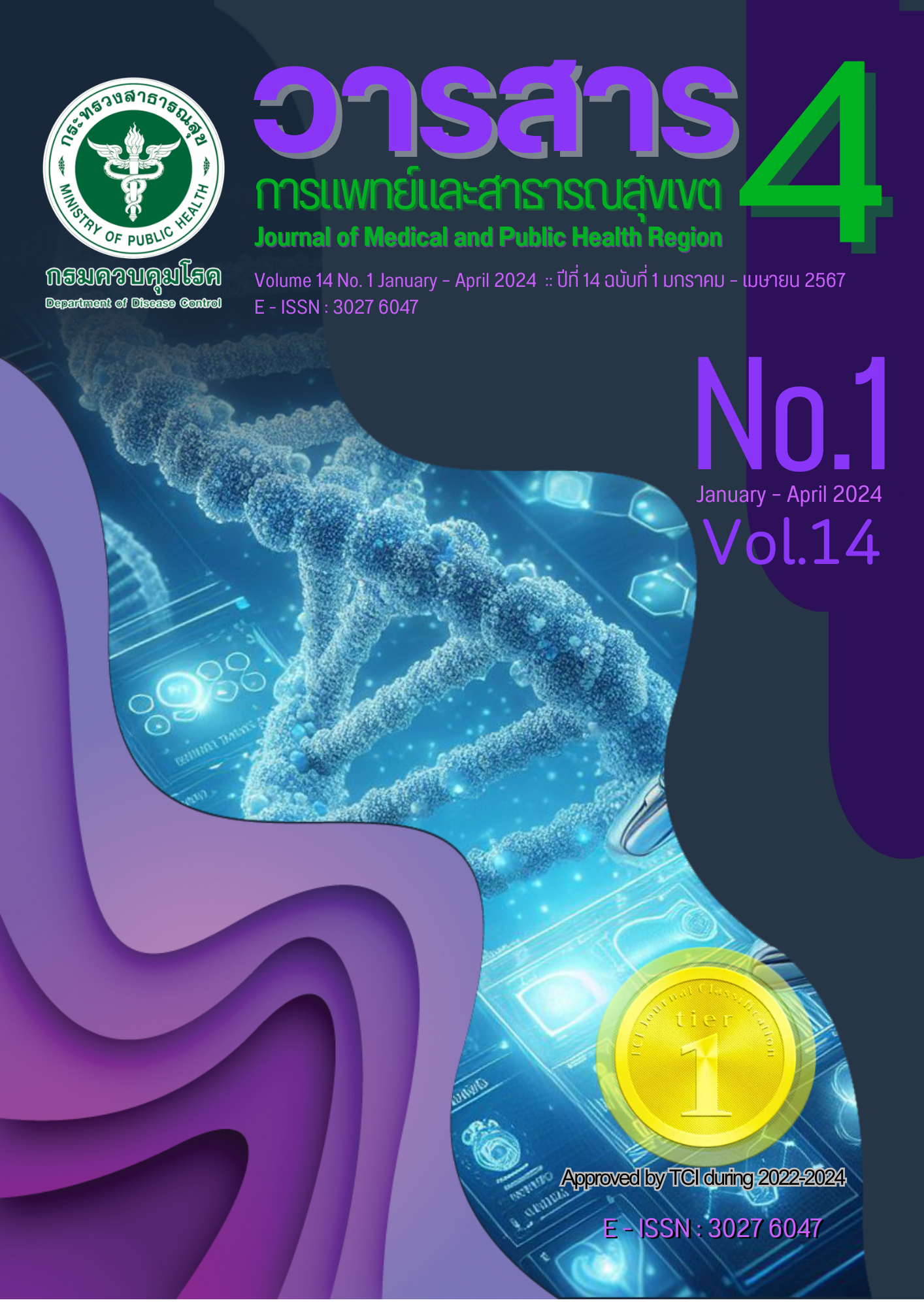A study of the relationship of advance care planning with actual end of life care in patients receiving palliative care, Pathum Thani Hospital
Main Article Content
Abstract
This study aimed to determine the needs and outcomes of advance care planning of patients receiving palliative care by using a retrospective cohort study method. The data of this study were collected from medical record of advance care planning of terminally ill patients and actual outcomes of patients receiving treatment at the palliative care clinic of Pathum Thani Hospital in a year 2022, totaling 226 people. The statistics were analyzed by mean with standard deviation, percentage and chi-square at P-value < 0.05. The study found that most of patients’ Palliative Performance Scales (PPS) were in the rage of 10 - 30 and 90.71% of patients were terminal cancer. 92.47% had advance care planning. Regarding advance care planning, it was found that 98.08% of the patients received actual care according to the needs recorded in the exclusion of intubation, 99.06% in exclusion of cardiopulmonary resuscitation (CPR) and 87.21% for the place of death. Increasing in public awareness should have relevant organizations such as the National Health Commission or the Ministry of Public Health should publicize through various media to increase awareness of planning care in terminal ill patients joint advance care planning between patient family and caring team. It also reduces the provision of treatment that is non-beneficial treatment and inconsistent with the patient's needs.
Article Details

This work is licensed under a Creative Commons Attribution-NonCommercial-NoDerivatives 4.0 International License.
References
Booncharoen T. New trends in health technology. Journal of Science and Technology 2013; 6(2): 25-32.
Harutha C, Leelawong S, Atthachaiwat A, Suwonkesawong S. Palliative nursing service system. Nonthaburi. Suetawan; 2016. (in Thai)
World Health Organization. Palliative care [Internet]. 2020 [cited 2023 July 4]. Available from http://www.who.int/mediacentre/factsheets/fs402/en/(Footnotes)12. (in Thai)
Public Health Statistics A.D. 2021. [cited 2023 July 8]. Available from: https://dmsic.moph.go.th/index/ detail/9127. (in Thai)
Ministry of Public Health, Department of Medical Services. Guidelines for caring terminal ill patient. Bangkok. Ministry of Public Health; 2017. (in Thai)
Tipkanjanaraykha K, Saleekul S, Apisitwasana N, Thiammok M. Advanced Care Planning for Peaceful Death. Journal of Boromarajonani College of Nursing 2017; 33(3): 138-45. (in Thai)
Pokpalagon P. Palliative Care model in Thailand. Nursing Journal of the Ministry of Public Health 2017; 26(3): 40-51. (in Thai)
Rajavithi Hospital. Guideline for palliative and end of life care. Bangkok. Rajavithi Hospital; 2021. (in Thai)
Acheepan C, Tangcharoensathien V, Prakongsai P, Wasvit J, Hintamai A, Tiampaiwan A. Survey of Healthcare Access and Health Expenditure of the Deceased Patients 2005-2006. International Health Policy Program; 2007. (in Thai)
National Board of Health. Palliative care for terminally ill patients. Nonthaburi. Pimdee publishing; 2013. (in Thai)
Dhirarotwit S. The exercise of the refuse treatment right of the terminally-ill patient under the national health laws: A comparative study of Thailand and Taiwan. Ramkhamhaeng Law Journal 2022; 11(1): 3-29. (in Thai)
Chiang Mai University, Faculty of Medicine, Department of Family Medicine. Guidelines for making a letter of intent not to receive public health services solely to prolong death at the end of life or to end suffering from illness (Living will). (2nd ed.) Chiang Mai: Department of Family Medicine, Faculty of Medicine, Chiang Mai University; 2019. (in Thai)
Rotpenpian P. Advance Care Planning in the Palliative Patients. Srinagarind Medical Journal 2021; 36(6): 755-60. (in Thai)
Stiel S, Heckel M, Seifert A, Frauendorf T, Hanke RM, Ostgathe C. Comparison of terminally ill cancer-vs. non-cancer patients in specialized palliative home care in Germany-A single service analysis. BMC Palliative Care 2015; 14(1):1–7.
National Cancer Institute. National Cancer Control Program. Bangkok. The Printing Office Agency to assist veterans in Royal Shu patham; 2018. (in Thai)
Satsin T, Matchim Y. End-of-life care: The context of the emergency room. Vajira Nursing Journal 2017; 19(1): 1-9. (in Thai)
National Cancer Institute, Department of Medical Services. National Cancer Prevention and Control Plan. Bangkok. The Printing Office Agency to assist veterans in Royal Shu patham; 2019. (in Thai)
National End of Life care Program. Capacity, care planning and advance care planning in life limiting illness. Leicester: United Kingdom; 2011.
Sritharathikun P, Nethipoomkun S. Impact of advance care planning on the end-of-life care in Maesot Palliative Care Clinic, Tak Province, Thailand. Journal of Primary Care and Family Medicine 2021; 4(1): 97-111. (in Thai)
Rotpenpian P, Bunnug P, Tengrunsun S. Knowledge, experiences and barriers in advance care plan for terminal cancer patients of family medicine residents. Srinagarind Medical Journal 2021; 36(4): 460-8. (in Thai)
Boonyoung S, Wisai K. Palliative Outcome Score, Stress and Depression of the Caregiver safety Implemented Home-Based Palliative Care Guideline among Terminally Ill Patients of Primary Care Network, Phrao District, Chiang Mai Province. Lanna Public Health Journal 2020; 16(2): 104-17. (in Thai)
Boonmorakot p. Chunuan S. Palliative care to cancer patients: The effects of a systematic advance care planning on the refusal of end of life-sustaining. The Southern College Network Journal of Nursing and Public Health 2022; 9(1): 270-82. (in Thai)


